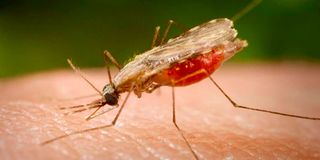WHO approves second malaria jab for children, to cost as low as Sh300

Anopheles mosquito. It is the main vector for malaria.
A malaria jab that was tested in Kenya has been prequalified for use by the World Health Organization (WHO) and will cost as low as Sh300 to Sh600.
The drug which was tested in three other African countries, becomes the world’s second vaccine to be added to the global prequalified list.
The regulator had in October this year recommended the R21/Matrix-M jab for the prevention of malaria in children following the advice of the WHO Strategic Advisory Group of Experts (SAGE) on Immunization and the Malaria Policy Advisory Group.
This came after Phase III trials which enrolled 4,800 children aged five months to three years in four countries across Africa namely; Kenya, Mali, Burkina Faso and Tanzania.
In Kilifi County, where 600 children were recruited, the trials were led by Professor Mainga Hamulaba, the head of clinical research and clinical trials at the Kenya Medical Research Institute-Wellcome Trust Research Programme(KWTRP).
The prequalification, according to the global health body, means larger access to vaccines as a key tool to prevent malaria in children with it being a prerequisite for vaccine procurement by Unicef and funding support for deployment by Gavi, the Vaccine Alliance.
As part of the prequalification process, WHO applies international standards to comprehensively evaluate and determine whether vaccines are safe, effective and manufactured to international standards. WHO also ensures the continued safety and efficacy of prequalified vaccines through, for example, regular re-evaluation, site inspection and targeted testing.
This means that prequalification supports the specific needs of national immunization programmes with regards to vaccine characteristics such as potency, thermostability, presentation, labelling and shipping conditions.
“The R21 vaccine is the second malaria vaccine prequalified by WHO, following the RTS, S/AS01 vaccine which obtained prequalification status in July 2022. Both vaccines are shown to be safe and effective in clinical trials, for preventing malaria in children. When implemented broadly, along with other recommended malaria control interventions, they are expected to have a high public health impact,” WHO explained in an official announcement.
It added that malaria, a mosquito-borne disease, places a particularly high burden on children in the African region. Nearly half a million children die from the disease each year.
“Globally, in 2022, there were an estimated 249 million malaria cases and 608,000 malaria deaths across 85 countries. The prequalification of the world’s second malaria vaccine, developed by Oxford University and manufactured by Serum Institute of India, is poised to expand access to malaria prevention through vaccination. Demand for malaria vaccines is high but the supply has thus far been limited, “WHO said.
The availability of two WHO recommended and prequalified malaria vaccines is expected to increase supply to meet the high demand from African countries and result in sufficient vaccine doses to benefit all children living in areas where malaria is a significant public health risk.
"Achieving WHO vaccine prequalification ensures that vaccines used in global immunization programmes are safe and effective within their conditions of use in the targeted health systems,” Dr Rogério Gaspar, Director of the Department of Regulation and Prequalification at WHO said.
“WHO evaluates multiple products for prequalification each year and core to this work is ensuring greater access to safe, effective and quality health products".
According to Dr Kate O’Brien, Director of WHO's Department of Immunization, Vaccines and Biologicals, the prequalification is a huge step.
While responding to queries by “Nation”, the Kenya Medical Research institute (Kemri) described the jab as a valuable addition to the malaria toolbox.
“The availability of a second malaria vaccine for children in the region should increase access to this valuable addition to the malaria toolbox,” Kemri said in its official statement on the jab.





